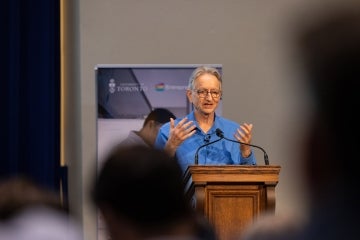
A student on the road less travelled
Published: September 5, 2013
Ten years ago, Paul McKeever was a stone mason with no high school diploma. Today, he is conducting cutting-edge research on the causes of Alzheimer’s disease, which blighted the final years of his grandmother’s life.
“My career path has been a bit unusual,” said McKeever earlier this summer, as he recovered from a mysterious insect bite he got cycling up Gates Gully, an asphalt-strewn hill in Scarborough known by mountain bikers as one of Toronto’s toughest climbs.
That’s a bit of an understatement. McKeever left high school with middling marks, nine credits shy of his diploma. He spent the next four years laying stones around Toronto before deciding to take his life in a different direction.
He enrolled in the City Adult Learning Centre and finished all nine credits in less than a year. He was accepted at U of T Scarborough as a mature undergraduate, and studied human biology and neuroscience before homing in on Alzheimer's.
A graduate student in U of T’s Department of Laboratory Medicine and Pathobiology, McKeever is chasing the molecular roots of Alzheimer’s in the lab of Janice Robertson, a Professor in the Tanz Centre for Research in Neurodegenerative Diseases.
He will soon finish his master's and has an eye on doctoral study.
McKeever's interest in this enigma of aging arose from seeing his grandmother die with the disease. "She was one of the most amazing people in my life. When someone so lovely forgets your name, it really affects you," he says.
In Robertson's lab, McKeever works with a mouse model of Alzheimer's, developed by scientists at the Tanz Centre, to explore the inner workings of brain cells called cholinergic neurons. His goal is to figure out what makes these neurons susceptible to dysfunction early in the disease, with the hope of one day intervening before the cells start to die.
McKeever uses a new technique called TRAP (for Translating Ribosomal Affinity Purification) on cholinergic neurons. This process allows him to isolate the neurons’ messenger RNA — key molecules that control the movement of genetic information from genes to proteins. He then runs the resulting data through a Next Generation Sequencing technology called RNA Seq, housed in the Donnelly Centre for Cellular and Molecular Biology.
The combination of the two technologies allows McKeever to pick up minute changes in gene expression that were undetectable just a decade ago. He’s waiting on results from a recent experiment that could reveal new genes active in Alzheimer’s.
“Paul has been a great addition to the lab, coming with a maturity only gained through life experience,” says Robertson, who holds the Canada Research Chair in Molecular Mechanisms of Amyotrophic Lateral Sclerosis. “He has a rampant enthusiasm for research, he’s full of ideas and he’s an important part of our group, which is critical as teamwork is essential for making the big discoveries. I can fully relate to Paul as my grandmother also had Alzheimer’s — it was really tragic.”
McKeever is also passionate about teaching. Since 2009, he has done 15 teaching assistant appointments in several neuroscience courses, including neuroanatomy, learning and motivation, and synaptic organization of the brain.
Outside the lab, he helps maintain cyclist etiquette and safety as a ride leader for the Beaches Cycling Club, and this spring he entered and won his first Ontario Cycling Association Elite 4 road race — a 95-kilometre loop around the Lake of Bays through hail and snow.
In stationary moments, McKeever plays classical piano, a pursuit he has taught off and on since his time as a mason. His early struggles, it seems, have paved the way for a lasting drive and ability to focus.
“Look at our population curve,” says McKeever. “Neurodegenerative disease is the field to be in, if you want to make a difference. Alzheimer’s is about to become our worst-kept burden, which is why we need answers now.”



